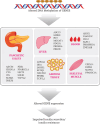The Impact of Epigenetics on the Pathophysiology of Type 2 Diabetes and Associated Nephropathic Complications
- PMID: 39881775
- PMCID: PMC11774419
- DOI: 10.4103/ijem.ijem_43_24
The Impact of Epigenetics on the Pathophysiology of Type 2 Diabetes and Associated Nephropathic Complications
Abstract
Type 2 diabetes (T2D) is a long-term metabolic condition that presents considerable health challenges globally. As the disease progresses, the interplay between genetic, environmental, and lifestyle factors becomes increasingly evident, leading to complications. Epigenetics has emerged as a critical area of research, providing insights into how these factors can modify the expression and cellular behavior without altering the underlying DNA sequence. Various epigenetic mechanisms, including DNA methylation, histone modifications, chromatin remodeling, and non-coding RNA regulation, drive cell dysfunction, inflammation, and fibrosis, aggravating diabetes and its complications. Amongst all the complications diabetic kidney disease (DKD) also known as diabetic nephropathy (DN), is a significant microvascular complication often regarded as a silent killer, as early diagnosis remains highly complicated. This review investigates various epigenetic modifications associated with T2D and DKD, employing a database search strategy incorporating the PICO framework method to ensure comprehensive coverage of relevant literature. Advancements in epigenome profiling provide valuable insights into the functional outcomes and chromatin states of cells impacted by T2D. Understanding epigenetics thus emphasizes its crucial role in the development and progression of T2D and transition to DKD, while also highlighting the potential reversibility of epigenetic modifications and potency as a biomarker for predicting DKD. More extensive research is needed to identify specific epigenetic mechanisms involved in DKD to further refine predictive models and therapeutic strategies. This unified exploration of significant epigenetic modifications offers a focused analysis of how these alterations influence the trajectory of disease and presents new avenues for therapeutic intervention.
Keywords: DNA methylation; Epigenetics; diabetic kidney disease (DKD); diabetic nephropathy (DN); histone modification; micro-RNA; type 2 diabetes (T2D).
Copyright: © 2024 Indian Journal of Endocrinology and Metabolism.
Conflict of interest statement
There are no conflicts of interest.
Figures






References
-
- Meigs JB, Cupples LA, Wilson PWF. Parental transmission of type 2 diabetes: The Framingham offspring study. Diabetes. 2000;49:2201–7. - PubMed
-
- McCarthy MI. Genomics, type 2 diabetes, and obesity. N Engl J Med. 2010;363:2339–50. - PubMed
-
- Barrès R, Osler ME, Yan J, Rune A, Fritz T, Caidahl K, et al. Non-CpG methylation of the PGC-1α promoter through DNMT3B controls mitochondrial density. Cell Metab. 2009;10:189–98. - PubMed
Publication types
LinkOut - more resources
Full Text Sources
Research Materials
